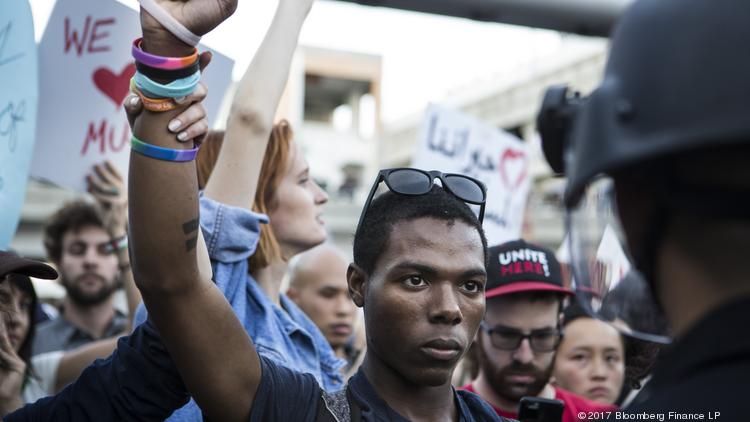| |
| |
E-Mail Forum – 2017 |
|
| |
< RETURN |
|
| |
Appeals court rules against Trump immigration ban
February 9, 2017 |
|
|
| Appeals court rules against Trump immigration ban
Feb 9, 2017, 3:16pm PST Updated Feb 9, 2017, 3:30pm PST
The U.S. Court of Appeals for the Ninth Circuit in San Francisco has ruled against an executive order from President Donald Trump temporarily barring entry to the country for citizens of seven Muslim-majority countries for 90 days.
A federal judge in Seattle on Friday had halted Trump’s executive order, which also suspended the entry of refugees of those countries for 120 days It also indefinitely bars Syrian refugees.
 Enlarge Enlarge
Demonstrators gather outside Los Angeles International Airport (LAX) to protest against… more
Dania Maxwell
"We have no difficulty concluding that the States’ injuries would be redressed if they could obtain the relief they ask for: a declaration that the Executive Order violates the Constitution and an injunction barring its enforcement," wrote the unanimous opinion from the appellate court's three judges. "The Government does not argue otherwise."
The administration had a deadline on Tuesday with the Ninth Circuit to argue why the judge’s order should be reversed.
“The work of the Judiciary, and this court, is limited to ensuring that the actions taken by the other two branches comport with our country’s laws, and more importantly, our Constitution,” U.S. District Judge James L. Robart, an appointee of President George W. Bush, wrote in his opinion last Friday.
The 16 states who have challenged the ban have said the executive order violates both the Equal Protection Clause, which is part of the 14th Amendment, by discriminating based on religion and national origin — as well as the Establishment Clause in the First Amendment to the Constitution because it shows a clear government preference for one specific religion over others.
But the Trump administration has argued that the temporary hold should be lifted, while the legality of the executive order wends its way through the courts. Its brief had argued that if the ban was lifted, it should at most apply only to “previously admitted aliens who are temporarily abroad now or who wish to travel and return to the United States in the future.”
Trump tweeted about the case early Wednesday, saying, "If the U.S. does not win this case as it so obviously should, we can never have the security and safety to which we are entitled. Politics!"
The San Francisco case was heard by Judge Richard R. Clifton, appointed by President George W. Bush; Judge William C. Canby Jr., appointed by President Jimmy Carter; and Judge Michelle T. Friedland, appointed by President Barack Obama.
Legal experts had expected the court to rule against Trump, and to do so quickly.
“Virtually every judge to consider the executive order has said that there is a substantial likelihood that it is unconstitutional,” Erwin Chemerinsky, dean of the UC Irvine School of Law, told the L.A. Times this week.“Both Republican and Democratic appointees have come to this conclusion. Having read some of the briefs in these cases, I think any court is likely to come to this conclusion.”
On Sunday, nearly 100 companies, mostly based in the Bay Area, filed a legal brief challenging Trump's temporary travel ban on Sunday, arguing that it hurts business and violates the Constitution.
“The tremendous impact of immigrants on America — and on American business — is not happenstance,” the companies wrote in the brief, filed with the same court.
“People who choose to leave everything that is familiar and journey to an unknown land to make a new life necessarily are endowed with drive, creativity, determination — and just plain guts. The energy they bring to America is a key reason why the American economy has been the greatest engine of prosperity and innovation in history.”
In all, 97 companies signed the legal brief. These notably included Apple, Google, eBay, Facebook, Intel, Microsoft, Netflix, Salesforce, Twitter, and Uber. Cisco, Oracle, and Tesla were conspicuously absent from the list. |
|
| |
< RETURN |
|
|

